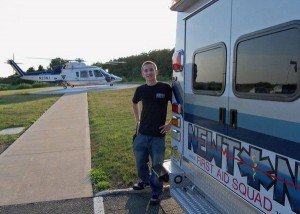Every day at Ithaca College we go about our normal routine, taking our health and safety for granted. It’s when we least expect it that we get a serious illness, an allergic reaction, alcohol poisoning, or a traumatic injury such as breaking a bone. It’s impossible to know when or where you may need medical attention.
SUNY-Cortland, the University of Rochester, Cornell University, and hundreds of other universities and colleges around the nation have set up fully functioning First Response Emergency Medical Services on their campuses. These EMS squads are run and operated by volunteer student Emergency Medical Technicians who have equipment to help treat medical emergencies while waiting for an ambulance to arrive.
Unfortunately, Ithaca College does not have one of these squads and does not provide any medical services on campus at night when partying college students are most likely to need medical assistance. As the EMS Project Coordinator for Students for Sensible Drug Policy and a class of 2015 Student Government Association Senator, I am working with the college to change this.

I am an EMT in New Jersey and New York. I have also been involved in EMS for more than three years as well as being a trained firefighter. I speak from personal experience when I say that providing emergency services to students will save lives. To date, I have performed four CPR/AED saves, numerous critical injury or illness saves and five medical evacuation calls. In 2011 alone I responded to more than 300 emergency calls.
Having an EMS team would bring positive health-related changes. If our EMS becomes certified in New York state, EMT training to the members of the organization would be provided for free. This type of training could provide an overall safer environment at the college. For instance, by just going about my everyday life, I have come across four people on campus with medical emergencies ranging from broken bones to unconsciousness. I was able to help them while waiting for ambulances to arrive.
Bangs Ambulance has responded to calls from the college more than 400 times for 911 emergencies since August 2009. In 2011 alone, they addressed more than 160 medical emergencies on campus, an increase from 2009 and 2010. Of those calls, more than 100 were critical emergency or Advanced Life Support calls. For these types of calls it is vital to quickly have medical staff on-site. For calls that aren’t critical and don’t require hospital care, EMS would be able to take care of someone for free and provide the same Basic Life Support assessment that Bangs charges more than $500 for.
Besides providing free medical evaluations and treatment, our volunteer organization would train anyone in CPR and AED usage, provide free EMS standbys for any event on campus when requested and do outreach programs to teach basic First Aid.
I am collaborating with a group of fellow students, and we are eager to start this program. We have already created our bylaws, standard operating procedures, budget and lists of students willing to volunteer for a NYS-certified First Response EMS. We hope the college administration will be willing to work with us to assure this future EMS program can respond to medical emergencies on campus to assist fellow students, employees of Ithaca College and anyone on our campus in a time of need.
Joshua Couce is a freshman politics major and an SGA senator. Email him at [email protected].







